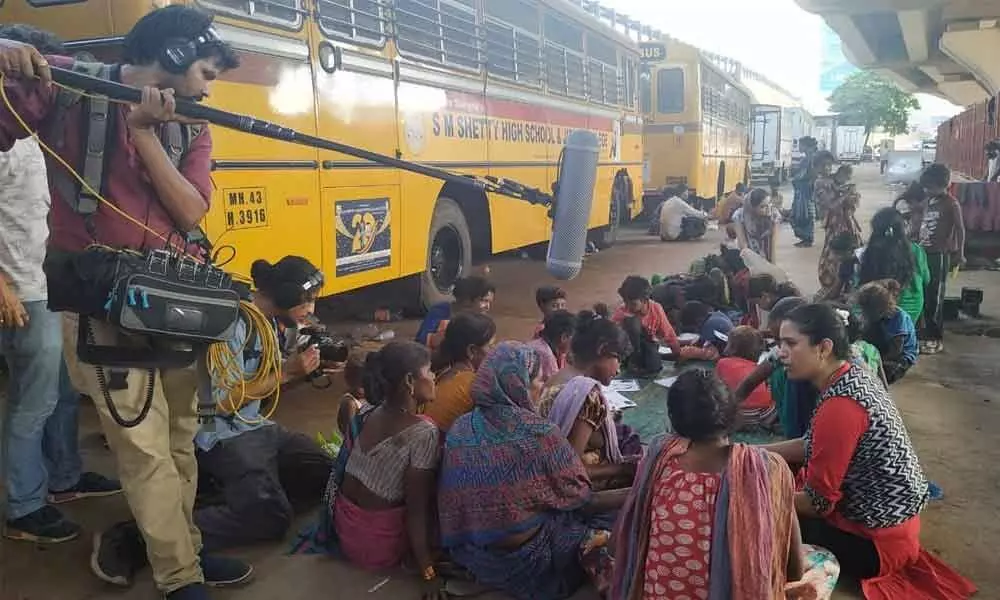Just In
The Invisible Visible,' to highlight the plight of India's destitute millions


The Invisible Visible
On October 10, observed globally as World Homeless Day, 6 time National award-winning director Kireet Khurana announced a documentary that he describes as a crusade on behalf of India’s invisibilised millions.
On October 10, observed globally as World Homeless Day, 6 time National award-winning director Kireet Khurana announced a documentary that he describes as a crusade on behalf of India's invisibilised millions. 'The Invisible Visible,' is an 81 minutes long documentary that will be released mid-2022 and was shot across Mumbai, Delhi, Patna, Dehradun, Kanpur and a few villages in Maharashtra and Bihar.
Says Khurana, "India has the largest number of homeless people. It has over 70 million destitute citizens who have been denied their Constitutional right to shelter. The draconian Bombay Beggary Prevention Act 1959 has further criminalized them and made them vulnerable to incarceration, torture and dehumanisation. The film delineates how the marginalized and the disenfranchised have been left out in the cold and in some cases, exploited in shelters under the watch of the state, as happened during the infamous Muzaffarpur case, where hundreds of girls between 6 and 15 were raped, tortured and killed."
This grim scenario is explored through the gaze of social organisation 'Koshish' which has helped countless traumatized homeless citizens including the survivors from the Muzaffarpur shelter. The film traces the inception of Koshish from the time in 2003, when Tarique, a 17- year-old student from Hindu College went to a homeless shelter to distribute food and was devastated by the misery confronting him.
Khurana informs, "At 23, Tarique started 'Koshish', and the film traces the organisation's trailblazing grassroots work and its advocacy in synergy with intellectuals and policy makers to repeal archaic, anti-poor laws. We have also incorporated the views of eminent individuals, stakeholders, top lawyers and NGOs who stand up for the homeless to understand where the system is broken and how it can be fixed. This is not just a film but a crusade to raise the level of human conscience and build a momentum against the sordid Bombay Beggary Prevention Act, (1959)."
Kireet also hopes that the film will serve as a catalyst for states to set up shelters for the homeless in each district and last but not the least, have independent and credible agencies to audit them regularly. The film does not just remind the bureaucracy and the law-makers of their responsibilities but also showcases the relentless work of a few good samaritans who have dedicated their lives to the cause.
Kireet inherited the gene of purposeful story-telling from his father, the multiple award-winning animation pioneer Bhimsain. In fact, when he returned to India after graduating with honors from Sheridan College in Canada, he established the production house Climb Media which was named after Bhimsain's acclaimed animation short, The Climb (the film had won the Silver Hugo Award at the Chicago Film Festival in 1970). Says Kireet, "Thanks to my father, from a very early age, I found myself in a fertile environment of creative thinking, film making and storytelling. I learnt that films have the power to influence, inspire and bring socio-cultural and political shifts and change the course of humanity for better. My father Bhimsain was a new age, avant garde director and filmmaker who sensitized me to human stories and socially inclusive narratives to achieve change, no matter how small."
Kireet quotes Plato, "Those who tell stories, rule society" and says , "This quote is apt even today and we must against all odds tell stories of triumph, humanity, compassion and empowerment because only these can bring us together in these divisive times. This is my raison d'etre."

© 2024 Hyderabad Media House Limited/The Hans India. All rights reserved. Powered by hocalwire.com






